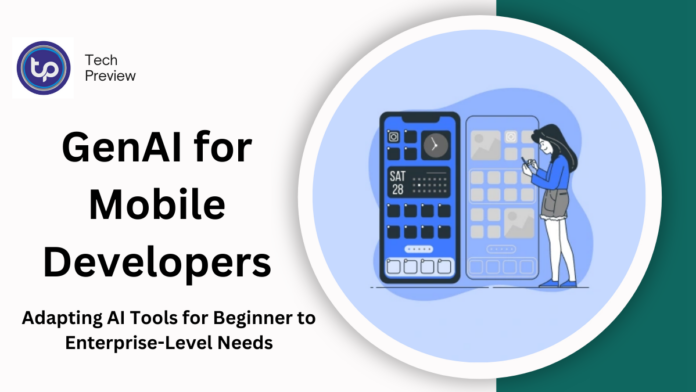Generative AI (GenAI) is rapidly transforming the mobile development world, reshaping how apps are designed, tested, and launched.
However, mobile developers come with varying levels of experience, expertise, and work styles. To truly harness the capabilities of GenAI, it’s essential to craft tools that resonate with the specific needs of different developer profiles.
By recognizing the distinct characteristics and demands of these personas, GenAI products can be tailored to maximize productivity, creativity, and efficiency.
Defining Mobile Developer Personas
What Are Developer Personas?
Developer personas represent various types of mobile developers categorized by their skill sets, goals, and preferences.
These personas span a broad spectrum, ranging from hobbyists working on small-scale apps to experienced developers handling large, complex systems.
Recognizing these differences helps ensure that GenAI tools are adaptable and user-friendly for a wide range of users.
Key Mobile Developer Personas
- Novice Developers
Typically beginners or students, novice developers are still familiarizing themselves with programming concepts. They seek user-friendly tools that include detailed documentation, tutorials, and visual aids to ease their learning process. - Freelance Developers
Freelancers juggle multiple projects with varying requirements. They need tools that offer flexibility, cost-effectiveness, and the ability to handle diverse client needs. Freelancers appreciate GenAI solutions that support rapid prototyping, quick iterations, and scalability. - Startup Developers
Developers in startups are often focused on innovation and speed, needing GenAI tools that facilitate quick idea prototyping, allow for seamless team collaboration, and scale efficiently as their projects grow. Startups need tools that support agility and foster creativity. - Enterprise Developers
Working within large organizations, enterprise developers manage complex projects that often require integrating multiple systems. They need GenAI tools that prioritize security, support large-scale deployments, and offer customizable solutions tailored to corporate needs. - Specialized Developers
These developers focus on specific areas like gaming, augmented reality (AR), virtual reality (VR), or fintech. They require highly specialized tools equipped with features unique to their industries, such as AI-based simulations for gaming or regulatory compliance tools for financial applications.
MUST READ: Starlover0104 on GitHub: Empowering Developers Through Open-Source Projects
Core Capabilities of GenAI
- Automated Code Generation
GenAI tools can automate mundane coding tasks, generate boilerplate code, and even suggest optimizations, reducing development time and improving code quality. - UI/UX Design Prototyping
GenAI enables rapid creation of user interfaces and prototypes, allowing developers and designers to visualize app concepts quickly and refine them iteratively. - Testing and Debugging Support
By detecting bugs, generating test cases, and simulating usage scenarios, GenAI enhances the testing process, helping developers identify issues early in the development cycle. - Localization and Accessibility
GenAI aids in making mobile apps more inclusive by providing automatic translations, cultural adjustments, and accessibility features to ensure apps cater to global audiences.
Novice Developers
For beginners, GenAI tools should be intuitive and offer comprehensive support to help users progress from learning the basics to building functional apps. Essential features include:
- Interactive Code Tutorials: Step-by-step guides to introduce coding concepts in an accessible manner.
- Drag-and-Drop Builders: Visual interfaces that minimize the need for complex coding, making it easier for newcomers to create apps.
- Clear Error Explanations: When errors occur, GenAI should provide detailed feedback, helping novices understand what went wrong and how to fix it.
Freelance Developers
Freelance developers need tools that prioritize efficiency without compromising flexibility. They often switch between different projects, so GenAI products should offer:
- Multi-Language Support: Flexibility to work with multiple programming languages and frameworks as freelancers often deal with diverse client requirements.
- Project Management Integrations: Seamless connections with tools like Jira, Trello, or Slack to streamline workflow management.
- Flexible Pricing Models: Subscription options that cater to the budget constraints of freelancers, allowing them to pay based on their usage.
Startup Developers
Startups thrive on rapid execution and agility. GenAI tools tailored for startup developers should provide:
- Rapid Prototyping: Tools that allow for quick app mock-ups and prototypes to visualize ideas and get feedback faster.
- Scalable Solutions: As startups grow, they need GenAI products that can scale with user demand, ensuring the app remains functional under higher loads.
- Collaborative Features: Real-time collaboration capabilities that allow team members to work together seamlessly, even if they are geographically dispersed.
Enterprise Developers
Enterprise developers are often dealing with large, complex systems and need tools that are robust and secure. Essential features include:
- Advanced Data Security: GenAI tools should ensure compliance with industry standards such as GDPR and HIPAA, providing secure data handling and protection.
- Custom API Integrations: The ability to integrate GenAI tools with legacy systems or third-party platforms is critical for enterprise-level applications.
- Advanced Analytics: Data-driven insights on app performance, user engagement, and overall system health powered by AI.
Specialized Developers
Specialized developers working in domains like gaming, AR/VR, or fintech need GenAI tools that cater specifically to their industry requirements. These include:
- Gaming Engines: GenAI tools with AI-driven rendering, simulation capabilities, and real-time feedback to improve game development workflows.
- AR/VR Tools: Support for spatial design and immersive content creation using GenAI for real-time 3D modeling and simulation.
- Regulatory Tools: GenAI products that help ensure fintech applications comply with financial regulations and standards.
Improving the GenAI Experience for Developers
For GenAI tools to cater effectively to different developer personas, they must offer:
- Adaptive User Interfaces: GenAI tools should adjust the level of complexity based on the user’s expertise, providing a personalized experience.
- Customizable Dashboards: Allow developers to configure their workspace according to their most-used features, optimizing their productivity.
- Tailored Learning Resources: Offer resources like tutorials and documentation that are specific to each persona’s needs, whether they are a beginner or an expert.
Collecting and Leveraging User Feedback
To improve tools continuously, it’s vital to gather feedback directly from developers:
- User Testing: Regularly testing tools with real developers ensures they are meeting actual needs and not just theoretical ones.
- Community Engagement: Online forums and user communities can provide valuable insights, allowing developers to share tips, report issues, and suggest improvements.
- Continuous Updates: GenAI tools must evolve over time, incorporating new features and fixing bugs based on feedback from the development community.
The Future of GenAI in Mobile Development
The future of GenAI in mobile development holds great promise, with several emerging trends shaping the landscape:
- Voice-Driven Development: Using voice commands to write code, debug, and interact with development environments is likely to become a mainstream feature.
- Real-Time Collaboration: As remote work and global teams grow, real-time collaboration tools powered by GenAI will become increasingly vital for distributed teams.
- Broader Accessibility: GenAI tools will make app development more inclusive, enabling non-technical users to participate in the app-building process through user-friendly interfaces and automated processes.
Conclusion
Adapting GenAI tools to meet the unique needs of different mobile developer personas is essential for maximizing their effectiveness.
Whether it’s a beginner learning to code or an enterprise developer managing large-scale systems, tailoring GenAI products ensures that developers of all types can take full advantage of AI’s capabilities.
By addressing the specific requirements of each persona, GenAI tools can significantly enhance productivity, creativity, and efficiency in the mobile development space.
People May Ask
What is a developer persona?
A developer persona is a fictional representation of a type of developer based on their skills, experience, and goals. Understanding these personas helps tailor tools and solutions that best meet their needs.
How can GenAI help novice developers?
GenAI tools can assist novice developers by providing step-by-step tutorials, simplified coding interfaces, and error explanations to guide them through the learning process.
What challenges do GenAI tools face in mobile development?
GenAI tools must balance complexity with usability, ensuring that they are accessible to beginners while still offering advanced features for experienced developers. Data privacy and resource usage optimization are also critical concerns.
How does GenAI support real-time collaboration?
GenAI supports real-time collaboration by providing features that allow developers to work together seamlessly, regardless of their location, through shared workspaces, project management integrations, and live code updates.
Will GenAI make app development more accessible?
Yes, by automating many of the complex tasks involved in app development and offering tools that are intuitive and easy to use, GenAI is making mobile app development more accessible to a broader audience, including those with little to no coding experience.
Click here to learn more.








